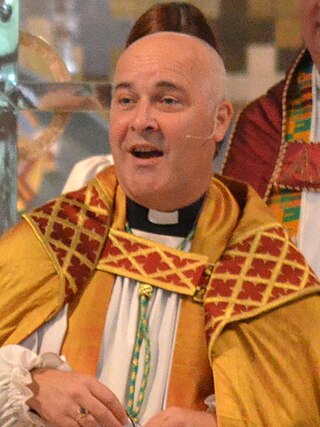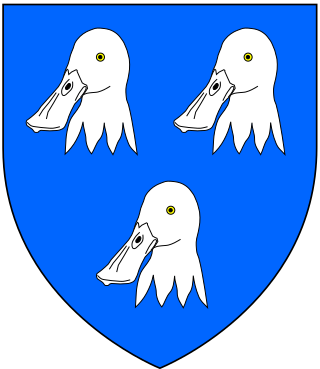Related Research Articles
William Courtenay was Archbishop of Canterbury (1381–1396), having previously been Bishop of Hereford and Bishop of London.

Richard Poore or Poor was a medieval English bishop best known for his role in the establishment of Salisbury Cathedral and the City of Salisbury, moved from the nearby fortress of Old Sarum. He served as Bishop of Chichester, Bishop of Salisbury and Bishop of Durham.
Silvester de Everdon was a medieval Bishop of Carlisle and Lord Chancellor of England.
Marmaduke Lumley was an English priest, Bishop of Carlisle from 1429 to 1450, and Knight Commander of the Order of St. John of Jerusalem. He was a son of Ralph de Lumley, 1st Baron Lumley and Eleanor de Neville. He was elected about 5 December 1429, and consecrated on 16 April 1430. He was Bishop of Lincoln for a short time before his death in December 1450. He was educated at University of Cambridge and was appointed Precentor of Lincoln Cathedral in 1425. He also became Chancellor of the University of Cambridge in 1427 and was Master of Trinity Hall, Cambridge from 1429 to 1443. From 1446 to 1449 he served as Lord High Treasurer of England. Lumley's tenure as Lord High Treasurer occurred during the Great Bullion Famine and the Great Slump in England.

Edward Story was an English priest, Bishop of Carlisle, 1468–1477, and Bishop of Chichester, 1477–1503.
John Langton was a chancellor of England and Bishop of Chichester.
William Alnwick was an English Catholic clergyman. He was Bishop of Norwich (1426–1436) and Bishop of Lincoln (1436–1449).
Robert Waldby was a native of York and friar of the Order of Saint Augustine who followed Edward, the Black Prince into Aquitaine, and undertook a number of diplomatic missions on his behalf. After studying at Toulouse, he became professor of theology there. He later became close to Edward's son, King Richard II. He was a firm opponent of John Wycliffe, wrote a book denouncing him, and was a member of the Synod which assembled at Oxford in 1382 to judge his orthodoxy.

The archbishop of York is a senior bishop in the Church of England, second only to the archbishop of Canterbury. The archbishop is the diocesan bishop of the Diocese of York and the metropolitan bishop of the province of York, which covers the northern regions of England as well as the Isle of Man.
Thomas Brunce was a 15th-century Bishop of Rochester and then Bishop of Norwich.
Robert of Holy Island was a medieval Bishop of Durham.
William Lenn was a medieval bishop of Chichester and bishop of Worcester. The name Lenn was the old name for Lynn in Norfolk.

William Reade or William Rede (c.1315–1385) was a medieval bishop, theologian and astronomer.
Stephen Patrington was a medieval Bishop of St. David's and Bishop of Chichester.

John Arundel was a medieval Bishop of Chichester.
Louis of Luxembourg;. Bishop of Therouanne 1415–1436, Archbishop of Rouen, 1436, Bishop of Ely 1437, Cardinal.

Edmund Lacey was a medieval Bishop of Hereford and Bishop of Exeter in England.

Richard FitzJames was an English academic and administrator who became successively Bishop of Rochester, Bishop of Chichester, and Bishop of London.
The Bishop of Waterford and Lismore is an episcopal title which takes its name after the city of Waterford and town of Lismore in Ireland. The title was used by the Church of Ireland until 1838, and is still used by the Roman Catholic Church.

The Dean of Cashel is the head of the Chapter of the Cathedral Church of St John the Baptist and St Patrick's Rock, Cashel, one of the Church of Ireland cathedrals of the united Diocese of Cashel, Ferns and Ossory.
References
- Fryde, E. B.; Greenway, D. E.; Porter, S.; Roy, I. (1996). Handbook of British Chronology (Third revised ed.). Cambridge, UK: Cambridge University Press. ISBN 0-521-56350-X.
- Walcott, Mackenzie Edward (1877). The Early Statutes of the Cathedral Church of the Holy Trinity, Chichester With Observations on Its Constitution and History. London: J.B. Nichols and Sons. OCLC 903307542.